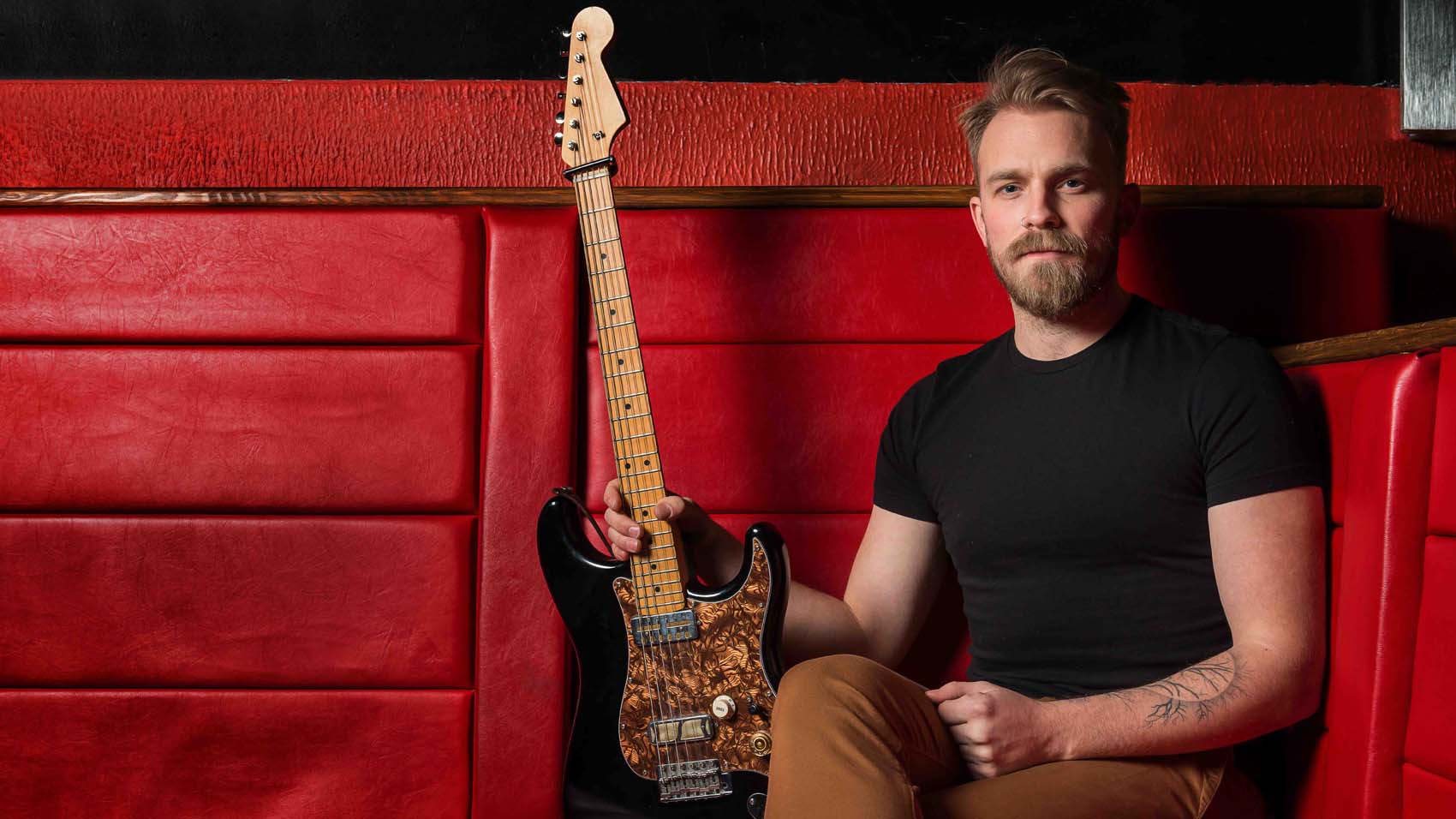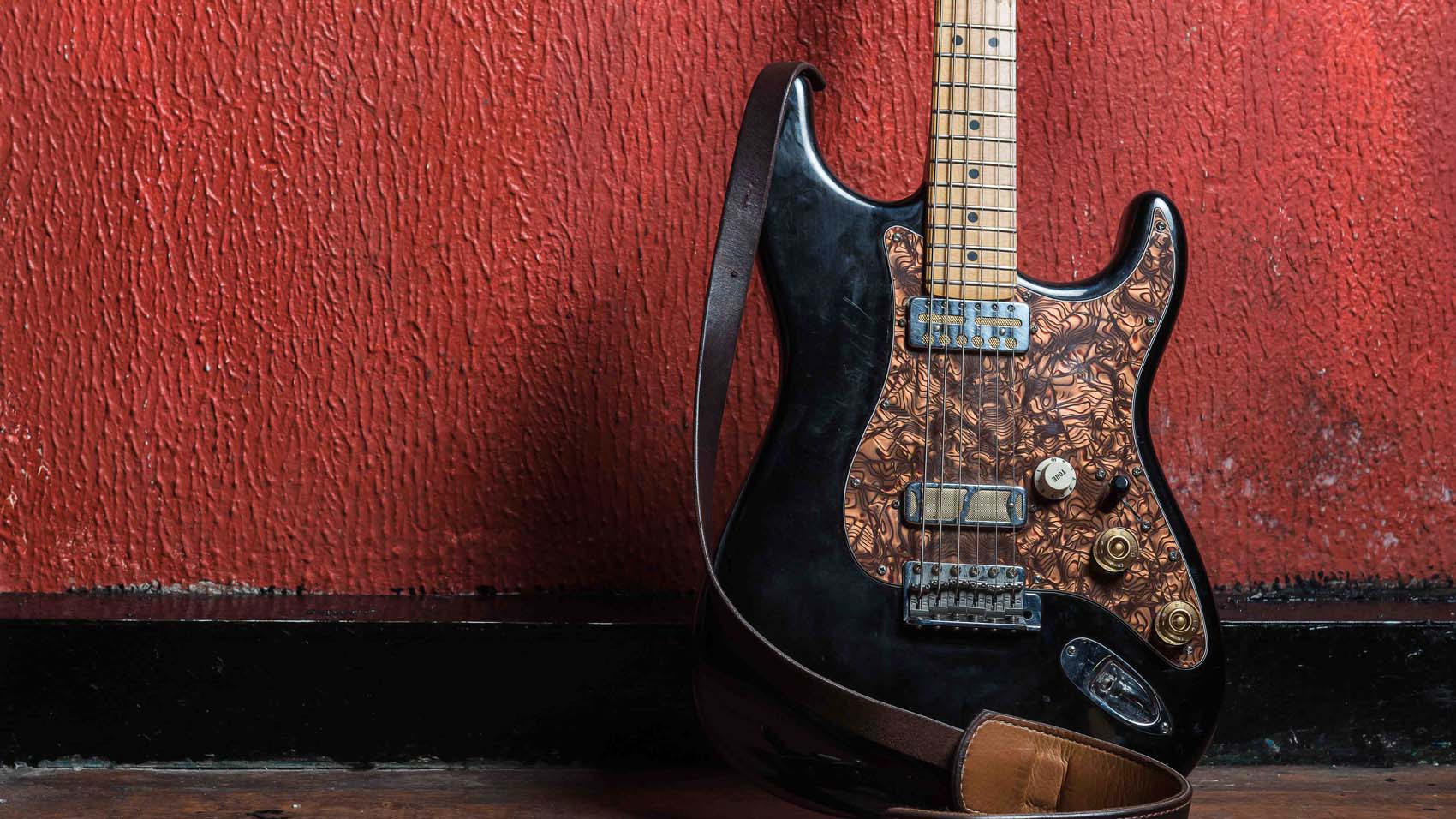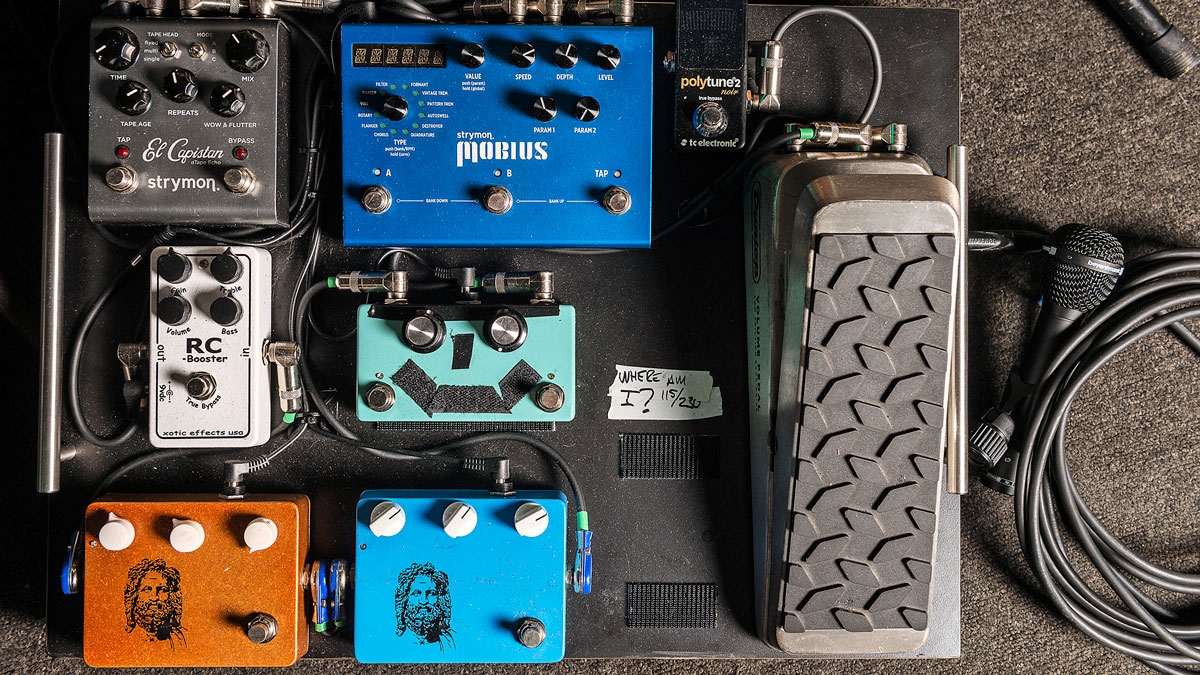Joey Landreth talks The Bros. Landreth, guitar tone and his Cooder-esque-caster
And no, he's not son of Sonny

"Everybody kinda knew... 'This kid's gonna be a guitar player whether we try to stop him or not!'"
Sat across the table in Witney’s Fat Lil’s pizza restaurant, 28-year-old Joey Landreth is feeling surprised. His band, The Bros. Landreth – formed in Winnipeg, Canada with brother/bassist David in 2012 – will take to the stage next door in an hour on the last in a string of sold-out UK dates promoting their debut album, Let It Lie.
It’s been over two years since the record was released, the slow burn becoming ever more intense over recent months as music lovers and guitar nuts alike catch on. Joey’s grateful surprise is because the gigs are full of people singing along to the songs. Our surprise is that with that voice atop this mix of blues, soul, incredible harmony and seriously well-crafted writing sensibilities, The Bros. Landreth aren’t a music-loving household name. Yet.
I think my first recallable memory as a human being was that I wanted to be a musician and play like my dad
Between slices of margherita, there’s a lot of ground to cover. So let’s rewind to the beginning – how did it begin for Joey with guitars and music?
“It goes back to my dad,” he offers, talking about Winnipeg musician, Wally Landreth. “He was a touring musician when we were growing up, and I think my first recallable memory as a human being was that I wanted to be a musician and play like my dad.
“I gravitated towards guitar when I was around eight. I guess it was an excuse to hang out with my dad some more because my parents were divorced. So, initially, we started off with two nights a week with dad, so guitar lessons was a cheater way to get an extra night! Then around 10 or 11 was when my mom was yelling up the stairs, ‘If you don’t put your guitar down and go to bed, I’m going to have to take it away!’ We all know that one [laughs].”
By the time you were in your mid-teens, Nirvana/grunge was long gone, Britpop was over and we’re guessing you weren’t a metal head. So, who were your musical and guitar heroes when you were growing up?
“Until I was around 14, I was a Stevie Ray Vaughan freak and I just spent all my time trying to learn solos and comping and stuff like that. I was really into Green Day, NOFX – punk bands – but I guess we didn’t really subscribe to what was happening in the early/mid-90s, musically. We’d listen to so much music at my dad’s house. Dinner time was a big thing because we’d all take turns picking dinner music, and it’d be cranked!
“The records that were on rotation were The Nightfly by Donald Fagan, A Go Go by John Scofield with Medeski Martin & Wood, a couple of Robben Ford records, Little Feat... Lots and lots of Little Feat – my dad was as big a fan of Lowell George’s singing as his guitar playing. He was into so much different stuff.”
Until I was around 14, I was a Stevie Ray Vaughan freak and I just spent all my time trying to learn solos and comping and stuff like that.
Before The Bros. Landreth band, you did session and touring work – how did you get into that?
“I got my first touring gig when I was 16, just at weekends, really, but every now and again, I’d have to take a Friday or a Monday off school. My teachers were actually really cool about it, just saying that as long as I could keep my grades up, they’d let it go. I wasn’t an amazing student and I think everybody kinda knew... You know, ‘This kid’s gonna be a guitar player whether we try to stop him or not!’
“The scene at home [in Winnipeg] is very nurturing in that I just started getting work from the older guys. It was almost as if they were saying, ‘Oh, Wally’s kid is on the scene and it looks like he’s not going anywhere, so we’d better start getting him some work.’ So stuff started to come in from when I was around 18, and before long I started to travel, although not much at first.
“I played with a great gospel singer from our neck of the woods, Steve Bell. I played on a bunch of his records, which was such an education because we sang a lot. There was a lot of harmony and I really cut my teeth as a background singer on his gig. After that, I started doing some country stuff, and the weird thing about the country scene in Canada is that it’s almost completely exclusive to Canada. Very few Canadian country acts make it over the border to the US. You can make your entire living and career in country music having never crossed the border into the US to play!
“Other than that, just working up the ladder. You know, establishing yourself on the scene, learning a lot of lessons, hopefully getting better...”
The slide features prominently in your playing – has that always been the case?
“Not really. It was probably when I was about 22 or 23 that I started. Sonny Landreth is a legend in our house...”
Aha, the obvious question! So you’re not directly related to Sonny Landreth?
“No. He is sort of distantly related, and he played on our dad’s records in the early 1990s. If you know anything about the Mennonites [Christian groups belonging to the Anabaptist denominations who settled in the US and Canada in the 17th, 18th and 19th centuries – Wiki Ed], if your last name is Weib or Friesen, you’re probably cousins... It’s kinda like that with the Landreths, there aren’t a ton of them. If you look back far enough, we’re all related.
“Anyway, my dad met him at the Winnipeg Folk Festival in 1989 and they just sort of bonded over the name. Then in 1990 or 1991, when my dad was making his record, he found out that Sonny was touring near to Winnipeg, and so he just called his management and asked if he’d play on his record. And he said yes.
“He’s always been a hero and sort of because of that, I stayed away from the slide. Y’know, being a Landreth there’s no reason to try and play slide guitar when he exists! Then around the time when Derek Trucks hit the scene, I realised I loved that sound so much. So I stopped fighting the urge.”

Introducing the Cooder-esque-caster
Was it hard to switch to slide when you’d been playing ‘standard’ for so long?
“To begin with, yeah. All my gigs around that time were a pop-country kinda thing. It wasn’t really conducive to playing inan open tuning, so when I started for the first year or two I was playing in standard. But, of course, there are just things you can’t do in standard – well, you can but they don’t sound right – so I slowly half- committed to playing in an open tuning. Then that became a pain in the ass because I was dragging two guitars around – one in standard, one in open – and so I just challenged myself to try.
"I had a couple of gigs at home that were sort of fun residencies where it wouldn’t matter if I clammed, so I just started to bring a guitar in open tuning to see if I could make it through the night. Eventually, it progressed to the point where I felt confident that I knew most of my go-to chord progressions and inversions in the open tuning, so I could leave the standard guitar at home. Now I’m at the point where I pick up a guitar in standard tuning and I have to flip a switch – I’m much more comfortable in open tuning now. It’s taken five years to get there.”
It took Jordan two years to finish [the guitar] and eight days after I got it, I dropped it, face first. My gigbag wasn’t zipped up and the irony is that I was rushing out the door to have a flight case made for it! I threw it over my shoulder, bam, face first, caved the top right in. I wept like a baby
What is your main tuning for slide?
“On the Coodercaster – well, it’s not a Coodercaster but the Cooder-esque-caster [laughs] – it’s the Duane Allman/Derek Trucks intervals: I V I III V I. That’s open E shape, just down-tuned with the bottom string at C. I’ve never been able to wrap my head around other tunings, although we were listening to a bunch of Little Feat today and I think I’m going to get a guitar and set it up in open A. I’ve gotta figure that out!”
Pick or fingers?
“Well, I usually have the pick in between my fingers. It doesn’t get a ton of use, but it’s there. I very rarely use the pick when I’m playing slide, but every now and then, when there’s a more bright twangy thing, it might be the pick. I really don’t think about it too much.”
And it’s a brass slide...
“Yep. I started out using glass because Sonny [Landreth] uses glass. Part of my slide player awakening was when I got my first Rock Slide – that’s the company that I use. That was the first profound ‘Aha!’ moment. The slide fit really well and it had a little more weight than I was used to. I like it! I haven’t used a glass slide in years.”
Tell us more about the Cooder-esque-caster you mentioned. That sounds like an interesting guitar...
“It’s a recent development. I have a dear friend – Dan Canfield – who runs a guitar store in Saskatoon called Village Guitar & Amp Co. I walked in there one day and said, ‘Hey man, there’s this guy Blake Mills [American singer-songwriter who plays slide], and you’re gonna love him.’ He started digging into some of that and it sent him down the Ry Cooder rabbit hole, so the next time I was there he shows me this guitar he’d thrown together. The first version of that guitar is in our video for I Am The Fool.
“Dan said he had these Gold Foil pickups that had come out of some old Harmony guitars that were unsalvageable. And he told me to just take it; keep the pickups if I liked them, or just hang on to the whole thing. It’s a really great guitar, even though it’s not valuable or anything.”
Your other main guitar looks a little more upmarket...
“Oh yeah, it’s made by a Canadian guitar maker called Jordan McConnell, who is more known for his acoustic guitars than electrics. He brought a lot of his acoustic skill set into electric guitars and it’s just killer. It’s a humbucker, centre-blocked semi with a Bigsby, but it has a spruce top and rosewood back and sides like an acoustic – so sort of unusual for an electric guitar. It’s immaculately put together, such a piece of art.
“Funny story about that guitar... It took Jordan two years to finish it and eight days after I got it, I dropped it, face first. My gigbag wasn’t zipped up and the irony is that I was rushing out the door to have a flight case made for it! I threw it over my shoulder, bam, face first, caved the top right in. I wept like a baby. Then it took him another two years to fix it! And he did an incredible job of piecing the poor beast back together.”

Lightbulb moments and Joey's pedalboard
The discipline on stage and the focus on singing, harmony and melody seems paramount for you guys. It’s not common in rock ’n’ roll bands, would you agree?
“Yeah, but it’s taken us a while to get there. When we first started playing out, we were a trio and I’d bring two amps and run them into cabs: massive guitar tones! But we just couldn’t [hear ourselves] sing and by the end of the night my voice was ragged, so doing a run of shows was a problem. So it just came to a point where we said, ‘We’ve just got to turn down,’ much to our own dismay. And that’s when the worlds opened up. Like, ‘Oh! This is how to do it!’
“I stopped bringing my [Marshall] Plexi out and started bringing my little [Fender] Deluxe instead, and leaning on pedals a little more for my overdrive sounds. So, yeah, there are certain compromises along the way, but the vision is that we’ve got to have these harmonies out front. We love harmonies and I love fun chord progressions, so that’s really the mission statement of the band. We have to get out of the way for the vocals and if that means my tone is not as exciting as it was once upon a time, then that’s just the way it is.”
It just came to a point where we said, ‘We’ve just got to turn down,’ much to our own dismay. And that’s when the worlds opened up. Like, ‘Oh! This is how to do it!’
We’re glad you mentioned chord progressions – there are a lot of, dare we say, ‘clever’ inversions and voicings in your playing, but without sounding forced or contrived. It hints at some wider guitar learning or study... What’s the story?
“Out of high school, for university I wanted to go to jazz school. I was always really into bebop and I love the older stuff – like Sonny Rollins, John Coltrane, the guys of that vintage. I mean, I’m not a good jazz player, but I do love the sensibilities and the harmony and feel. In fact, I’ve always been more of a geek about harmony thanI ever have about soloing or whatever, dissecting the harmonic content and figuring out how chord progressions and inversions move together. And substitutions – I love all that stuff. It’s a delicate balance, though. I have to not let it go too far because there have certainly been a couple of moments where I’m figuring out where the line is. And, ‘Oh, there it is! People are bored now [laughs].’
“Oh, and Ted Greene. I did a fair stint with his Modern Chord Progressions book. I spent quite a bit of time with that in standard tuning. Then I got into the kind of Bach-esque movement, core movement and I watched a bunch of videos of Ted where he’s talking about Bach and his counterpoint stuff. Analysing the Preludes and stuff – incredible harmony and well beyond my abilities. It’s pretty geeky shit!
“Other than that, it’s just fun throwing stuff in there that bends the other guy’s ear. I like it when you’re being challenged when you start to stretch out. Certain songs, you always want to play the solo note-for-note ’cos it’s always got to be there. Like on Let It Lie, if I deviate from that solo, I almost always regret it. But in other moments, I want to interact with the other guys; I want you to throw a different chord at me, or change the root movement, because it’s fun! Otherwise, you just end up playing the same shit over and over. I think that’s where that comes from.”
What’s next for The Bros. Landreth? A new record – please?
“Ha! Yeah, we’ve got to make another record because we’ve been touring so hard on this record, very little effort has been put into the next one, so we need to downshift to writing territory. We want a big pile of tunes to pick from and then do it all over again. I hope we can come back here before the end of the year – maybe even with a new record. We’re dying to come back to the UK, we’ve had such a blast here!”
Joey’s touring pedalboard includes:
Mythos Daedalus overdrive [JTM45 style], Mythos Mjolnir overdrive [Klon style], Xotic RC Booster, custom-made Octavia by Mythos, Strymon Mobius for tremolo and rotary speaker effects, Strymon El Capistan, Dunlop volume pedal. The empty space was for an Origin Effects Slide Rig Compact that Joey was trying for the first time in the UK.

